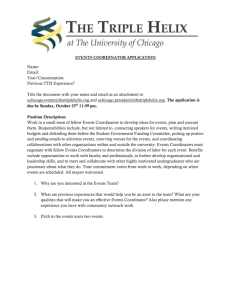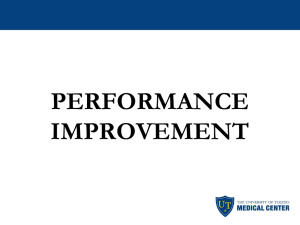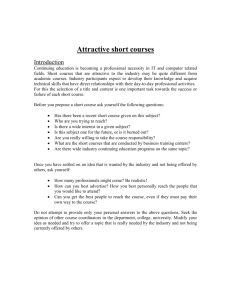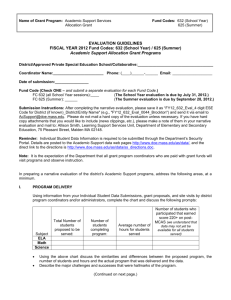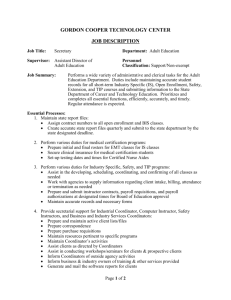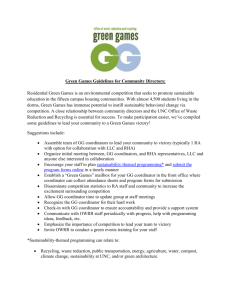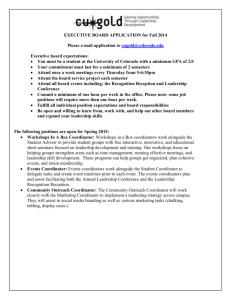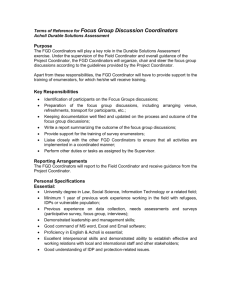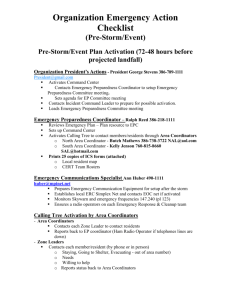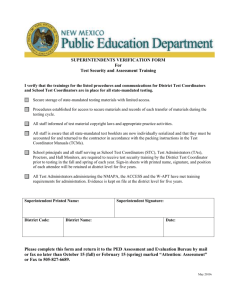North Carolina School Library Media Coordinator Evaluation Process
advertisement
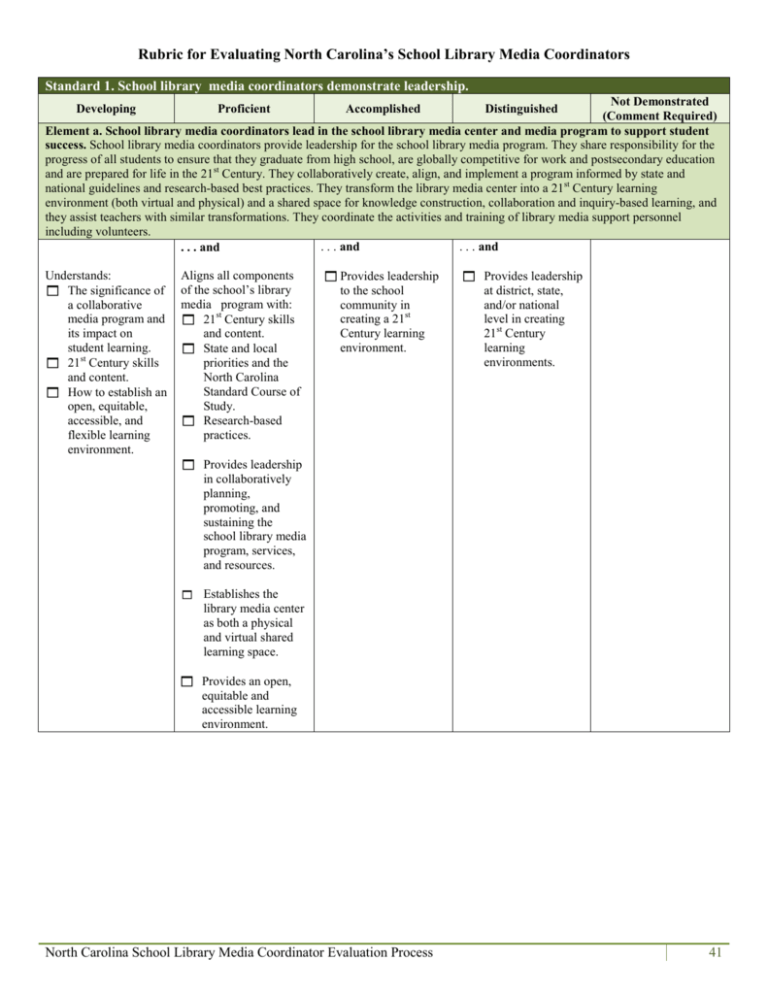
Rubric for Evaluating North Carolina’s School Library Media Coordinators Standard 1. School library media coordinators demonstrate leadership. Not Demonstrated (Comment Required) Element a. School library media coordinators lead in the school library media center and media program to support student success. School library media coordinators provide leadership for the school library media program. They share responsibility for the progress of all students to ensure that they graduate from high school, are globally competitive for work and postsecondary education and are prepared for life in the 21st Century. They collaboratively create, align, and implement a program informed by state and national guidelines and research-based best practices. They transform the library media center into a 21st Century learning environment (both virtual and physical) and a shared space for knowledge construction, collaboration and inquiry-based learning, and they assist teachers with similar transformations. They coordinate the activities and training of library media support personnel including volunteers. . . . and . . . and . . . and Developing Proficient Accomplished Distinguished Understands: The significance of a collaborative media program and its impact on student learning. 21st Century skills and content. How to establish an open, equitable, accessible, and flexible learning environment. Aligns all components of the school’s library media program with: 21st Century skills and content. State and local priorities and the North Carolina Standard Course of Study. Research-based practices. Provides leadership Provides leadership to the school community in creating a 21st Century learning environment. at district, state, and/or national level in creating 21st Century learning environments. Provides leadership in collaboratively planning, promoting, and sustaining the school library media program, services, and resources. Establishes the library media center as both a physical and virtual shared learning space. Provides an open, equitable and accessible learning environment. North Carolina School Library Media Coordinator Evaluation Process 41 Standard 1. School library media coordinators demonstrate leadership. Not Demonstrated (Comment Required) Element b. School library media coordinators lead in their schools. School library media coordinators work collaboratively with school personnel to create a professional learning community. They analyze data to develop goals and strategies in the school improvement plan that enhance student learning. They provide input in determining the school budget and in the selection and provision of professional development that meets the needs of the students, the staff, and their own professional growth. They participate in the hiring process and collaborate with their colleagues to support teachers in the improvement of the effectiveness of their departments or grade levels. They establish positive working relationships and communicate with other educators to identify and select resources for curriculum support. They also partner with teachers to design instruction that seamlessly integrates 21st Century skills, information fluency, and digital literacy across the curriculum. Developing Proficient . . . and Understands the goals of the school improvement plan. Participates in shared decision making within the school. Supports and participates in professional learning communities. Participates in the development and implementation of the school improvement plan. Infuses multiple literacies and 21st Century skills within content-area instruction. Provides technology-enabled one-on-one and group professional development for school-based educators. Participates in the Accomplished . . . and Assumes a leadership role in a Professional Learning Community and/or the school improvement team at the school level. Models and leads 21st Century teaching and learning concepts and strategies. Collaborates with teachers to integrate information and instructional technology into all curricular areas. recruitment hiring process and/or mentoring of school-based educators. North Carolina School Library Media Coordinator Evaluation Process Distinguished . . . and Assumes a leadership role in developing and implementing the school improvement plan. Participates in a professional learning network (PLN) at the district, state, and/or national level. Provides professional development on integrating information and instructional technology into all curricular areas at the school, district, state, and/or national level. 42 Standard 1. School library media coordinators demonstrate leadership. Not Demonstrated (Comment Required) Element c. School library media coordinators advocate for effective media programs. School library media coordinators are proactive in communicating the vision, requirements and impact of an effective 21st Century library media program to key stakeholders using relevant research, evidence of student learning, and other outcomes. They advocate for information fluency, inquiry-based learning, curriculum fidelity, creativity, planning, innovation and reading for enjoyment and lifelong learning to ensure that all students have access to proper learning resources and are prepared for the future. . . . and . . . and . . . and Developing Understands the need to advocate for the library media program and resources to support the learning community. Proficient Advocates for: Equitable access to 21st Century resources throughout the learning community. Integration of 21st Century skills and resources throughout the school’s instructional program. Appropriate staffing for the school library program. Policies and procedures to support effective school library media programs. Accomplished Distinguished Establishes internal Provides leadership and external partnerships to advocate for effective school library media program. beyond the school level in communicating the impact of library media program on 21st Century content and skills. Leverages partnerships to advocate at the local, district, state and/or national level for highly effective school library media programs. Shares relevant research, evidence of student learning, and other outcomes to educate the school community about effective school library media programs. North Carolina School Library Media Coordinator Evaluation Process 43 Standard 1. School library media coordinators demonstrate leadership. Not Demonstrated (Comment Required) Element d. School library media coordinators demonstrate high ethical standards. School library media coordinators demonstrate ethical principles including honesty, integrity, fair treatment, and respect for others. They uphold the Code of Ethics for North Carolina Educators (effective June 1, 1997) and the Standards for Professional Conduct adopted April 1, 1998. . . . and . . . and . . . and Developing Models ethical behavior as outlined in the Code of Ethics for NC Educators and the Standards for Professional Conduct. Models best practices in copyright, ethical access and use of resources, intellectual property, and digital citizenship. Proficient Educates students, teachers, and other members of the school community to use best practices in copyright, ethical access and use of resources, intellectual property, and digital citizenship. Accomplished Partners with other libraries and community organizations to promote the use of best practices in copyright, ethical access and use of resources, intellectual property, and digital citizenship. Distinguished Participates in state and/or national conversations regarding ethical access and use of resources, intellectual property, and digital citizenship. Examples of artifacts that may be used to support ratings: Staff development documentation Newsletters Conference documentation Websites School improvement and/or other leadership team documents PLC and/or PLN documentation Emails Informal communication with school staff Collaboration forms Articles and presentation documentation Professional organization activities North Carolina School Library/Media Rubrics and research Evaluator Comments: (Required for all “Not Demonstrated” ratings and recommended for all others.) Comments of Person Being Evaluated (Optional): North Carolina School Library Media Coordinator Evaluation Process 44 Standard 2. School library media coordinators build a learning environment that meets the instructional needs of a diverse population of students. Not Demonstrated (Comment Required) Element a. School library media coordinators establish a learning environment that facilitates access to resources and addresses the learning needs of all members of the school community. School library media coordinators create a welcoming and accessible physical space that facilitates active learning, promotes participation and collaboration and teamwork, and provides flexibility to accommodate multiple learning styles, 21st Century skills, and reading enjoyment. School library media coordinators incorporate a global view and multiculturalism in library services, programming, and collection development to meet the personal interests and learning needs of a diverse student population. They develop and implement strategies to remove barriers to open and equitable access to the library media center and its resources. .. . . and . . . and . . . and Developing Acknowledges that diversity impacts student learning. Proficient Utilizes data to understand the diverse needs of the school community. Provides open and equitable access to resources that accommodate diverse student needs and interests. Fosters global Accomplished Collaborates with teachers to develop culturally relevant classroom instructional practices. Leads professional Distinguished Recommends to school and/or district administrators changes to education programs and policies based on data analysis. development on resources and instructional strategies to meet the needs of a diverse population of students. literacy, awareness and cultural understanding. Element b. School library media coordinators provide appropriate resources, services, and instruction for learners at all stages of development. School library media coordinators model and promote the seamless integration of content, pedagogy, and technology to meet diverse student needs. They incorporate universal design to facilitate equitable access to information and resources for learning. They encourage the cultivation of creativity, reading interests, and critical thinking across multiple years of students’ school careers. . . . and . . . and . . . and Recognizes the need to: Use technology and research-based instructional strategies. Use innovative instructional strategies to engage students. Differentiate instruction. Cultivate student creativity, reading interests, and critical thinking. Uses technology and researchbased instructional strategies to deliver instruction. Uses innovative instructional strategies to engage students. Guides students to utilize critical thinking and creativity in the creation of new content. Collaboratively designs differentiated instruction that assures the integration of content, pedagogy, and technology across the curriculum. Leads professional development in the design of learning experiences that result in studentcreated content. Facilitates the collaborative design of learning experiences that cultivate creativity and critical thinking. Utilizes a variety of strategies to cultivate and support students’ reading interests. North Carolina School Library Media Coordinator Evaluation Process 45 Examples of artifacts that may be used to support ratings: Student-created content Usage data Assessment data Collection Management Plan Policies and Procedures Manuals Collaboratively produced lesson and unit plan Professional development plans Documentation of professional/electronic learning community activities Reflective journaling Blogs Articles written by school library media coordinator Listservs Newsletters Evaluator Comments: (Required for all “Not Demonstrated” ratings and recommended for all others.) Comments of person being evaluated (Optional): North Carolina School Library Media Coordinator Evaluation Process 46 Standard 3. School library media coordinators implement a comprehensive 21st Century library media program. Not Demonstrated (Comment Required) Element a. School library media coordinators develop a library collection that supports 21st Century teaching and learning. School library media coordinators develop an appropriate and high quality library media collection that facilitates 21st Century teaching and learning. They use collection mapping and other collection analysis tools to ensure that the collection is dynamic, learner-centered, supports the North Carolina Standard Course of Study, and meets the unique needs of the school and its learners. . . . and . . . and . . . and Developing Understands the components of a collection management plan. Recognizes that the collection management plan should be collaboratively developed and regularly updated. Proficient Systematically collects and utilizes data to collaboratively develop and regularly update the collection management plan. Accomplished Uses collection management plan data to solicit external resources to support collection development. Distinguished Provides leadership beyond the school level in best practices regarding the development and implementation of a high quality collection management plan. Ensures that the library collection: Is aligned with and supports the NC Standard Course of Study. Provides for the recreational and informational needs of students in a variety of formats. Element b. School library media coordinators serve, promote and facilitate inquiry-based instruction and the effective use of information and technology. School library media coordinators make their skills and expertise as well as the learning space and resources of the library media center flexibly available and easily accessible to all members of the school community. They help learners become discerning and effective users of information and ideas, and they promote the seamless integration of curriculum, pedagogy and technology to meet curricular goals. They encourage teachers and students to apply an inquiry-based approach to learning and actively support instructional practices that promote creativity and critical thinking. . . . and . . . and . . . and Understands and supports inquirybased approaches to learning. Collaboratively plans, implements, and assesses inquirybased instruction. Communicates the connection between a flexibly scheduled school library media program, collaboration with classroom teachers, and student learning. Ensures that library resources and technology are flexibly available and easily accessible. Leads other educators in the implementation of inquiry-based instruction. Shares data about library accessibility with the school community. North Carolina School Library Media Coordinator Evaluation Process Communicates data that illustrate the connection between an open and flexibly scheduled library media program, collaboration with classroom teachers, and student learning. 47 Examples of artifacts that may be used to support ratings: Collection Management Plan Library media center schedule Library media center sign-up sheets Collaboration forms Lesson plans Research Documentation of work with school staff, parents, and other members of the school community Output measures Data walls Evaluator Comments (Required for “Not Demonstrated” ratings and recommended for all others): Comments of person being evaluated (Optional): North Carolina School Library Media Coordinator Evaluation Process 48 Standard 4. School library media coordinators demonstrate knowledge of learners and learning and promote effective instructional practices. Not Demonstrated (Comment Required) Element a. School library media coordinators use effective pedagogy to infuse content-area curricula with 21st Century skills. School library media coordinators integrate 21st Century skills in instructional design, delivery, and assessment to meet curriculum objectives and produce positive learning outcomes for students. They promote best instructional practices and curriculum fidelity through collaboration and support to educators. They model and facilitate access to current information and technology tools and participatory and social learning. . . . and . . . and . . . and Developing Understands the need for participatory and social learning for 21st Century learners. Understands the Framework for 21st Century Learning. Proficient Utilizes participatory and social learning experiences in instruction. Collaborates with school staff to incorporate participatory and social learning into their instructional practices. Accomplished Models and leads other educators in the use of: Participatory and social learning experiences. The design, delivery and assessment of instruction that integrate 21st Century skills and content. Distinguished Assists content area teachers in understanding the relationship between the quality of instructional design and positive learning outcomes for students. Designs, delivers and assesses instruction that integrates 21st Century skills and content. North Carolina School Library Media Coordinator Evaluation Process 49 Standard 4. School library media coordinators demonstrate knowledge of learners and learning and promote effective instructional practices. Not Demonstrated (Comment Required) Element b. School library media coordinators know the content appropriate to their teaching specialty. School library media coordinators model, promote, and support other educators in the effective use of information resources, best practices in research, multiple literacies, digital safety, and the ethical use of information and technology resources. They collaboratively develop and utilize research-based pedagogical strategies to make the curriculum rigorous and relevant for all students and provide a balanced curriculum that enhances literacy skills. They apply the content standards for students developed by their professional organizations. School library media coordinators collaboratively design, use, and communicate innovative outcome measures to identify evidence of student learning using 21st Century skills across all curriculum areas. . . . and . . . and . . . and Developing Proficient Teaches students: Safe and ethical use of information and technology resources. Effective strategies for accessing, evaluating, and synthesizing information resources to support learning. Works with teachers to: Assure that students are safe and ethical users of information and technology resources. Integrate effective strategies for accessing, evaluating, and synthesizing information resources to support teaching and learning. Implement a school wide research model. Utilizes a research model in the school library media center. Demonstrates knowledge of curriculum goals across grade levels and subject areas. Accomplished Provides leadership in: The ethical and appropriate use of information and technology resources. Collaboratively assessing, evaluating, and synthesizing information resources to support teaching and learning. North Carolina School Library Media Coordinator Evaluation Process Distinguished Participates in district, state, or national conversations and debates regarding the safe, ethical and appropriate use of information and technology resources. Provides educational opportunities at the district, state or national level for professional staff members regarding the safe, ethical and appropriate use of information and technology resources. 50 Standard 4. School library media coordinators demonstrate knowledge of learners and learning and promote effective instructional practices. Not Demonstrated Developing Proficient Accomplished Distinguished (Comment Required) Element c. School library media coordinators promote reading as a foundational skill for learning. School library media coordinators champion reading for information, pleasure and lifelong learning. They build relationships with students to discover reading interests and assist in finding engaging and appropriate materials to encourage a love of reading. They partner with teachers in identifying the reading interests and needs of students and recommending appropriate resources. . . . and . . . and . . . and Identifies appropriate resources based on student interests and needs to scaffold and support differentiated instruction. Assists students in finding engaging and appropriate information resources by building on their interests. Challenges students to read: For pleasure. Independently. Increasingly complex materials. A variety of materials. Across a variety of subject areas and disciplines. Expands and enhances the quantity and quality of students’ reading activities. Promotes the use Partners with teachers in identifying the reading interests and needs of students. Recommends appropriate resources to address the reading interests and needs of students. of a variety of engaging and appropriate materials to support reading instruction. Involves stakeholders in leisure reading activities. Provides leadership in implementing community partnerships to support literacy programs. Examples of artifacts that may be used to support ratings: Documents written for a listserv Book fairs Collection management plan Records of students who have public library cards Participation in Battle of the Books Summer reading programs Student and teacher feedback about the school’s collection Community partnership activities Student reading records Family reading night Adult literacy courses Reading across the community programs Book clubs Evaluator Comments: (Required for all “Not Demonstrated” ratings and recommended for all others.) Comments of person being evaluated (Optional): North Carolina School Library Media Coordinator Evaluation Process 51 Standard 5. School library media coordinators reflect on their practice. Not Demonstrated (Comment Required) Element a. School library media coordinators analyze student learning. School library media coordinators use formative and summative assessments to collect data about student learning in the library media center and its impact on student achievement. They use multiple sources and types of data to improve their professional practice. . . . and . . . and . . . and Developing Proficient Accomplished Distinguished Thinks systematically and critically about the impact of the school library media program on student learning. Develops and implements a long-term strategic library program plan that: Is based on evidence and best practices. Reflects the goals of the school improvement plan. Seeks feedback from stakeholders on the effectiveness of service delivery and needed changes. Advocates for changes to the school library media program guided by action research findings. Collects and uses relevant data to improve their professional practice and the library media program. Conducts action research to determine the impact of the school library media program on student achievement. Collaborates with stakeholders to use action research findings in the implementation of the school library media program. Stays abreast of current research about student learning and emerging resources and encourages the school to adopt or adapt them for the benefit of all students. Leverages resources to implement action research findings. Element b. School library media coordinators link professional growth to their professional goals. School library media coordinators actively seek ongoing professional development to improve their practice and the effectiveness of the library media program. . . . and . . . and . . . and Develops and follows a professional growth plan aligned to evaluation results and professional practice needs. Understands that personal culture and experiences may impact professional practice. Participates in professional development that: Addresses professional growth goals. Reflects 21st Century skills and knowledge. Is aligned with State Board of Education and school and district priorities. Applies and implements knowledge and skills attained from professional development to improve the library program and their practice. North Carolina School Library Media Coordinator Evaluation Process Assesses the impact of professional development on the effectiveness of their instruction and the library program. 52 Standard 5. School library media coordinators reflect on their practice. Developing Proficient Accomplished Distinguished Not Demonstrated (Comment Required) Element c. School library media coordinators function effectively in a complex, dynamic environment. School library media coordinators adapt to a rapidly changing information and technology environment. They thrive in an increasingly digital information landscape and continuously adapt their professional practice based on research and student data to support school goals. . . . and . . . and . . . and Stays current with evolving research about the changing information and technology environment. Applies findings from evidence-based research to professional practices. Routinely monitors the impact of changes to professional practice. Seeks new ideas that support students’ social, emotional, psychological, and academic success. Changes practice to best meet the evolving needs of students, families, schools, and communities. North Carolina School Library Media Coordinator Evaluation Process Uses the results of monitoring activities to improve the school library media program. Shares results of monitoring activities and offers recommendations for the improvement of the school library media program throughout the school and district. 53 Examples of artifacts that may be used to support ratings: Self-assessment Documentation of continuing education—articles, conferences Feedback from supervisor, students, parents, community members, colleagues Professional development syllabi Professional growth plan Evaluation tool Student outcome data Logs Action research documentation Memberships in professional organizations Formative and summative assessments Student and school needs assessments Evaluator Comments (Required for all “Not Demonstrated” ratings and recommended for all others): Comments of person being evaluated (Optional): North Carolina School Library Media Coordinator Evaluation Process 54 Rubric Signature Page _______________________________________ School Library Media Coordinator Signature ____________________ Date _______________________________________ Principal/Evaluator Signature ____________________ Date Comments Attached: _____YES _____NO _______________________________________ ____________________ Principal/Evaluator Signature Date (Signature indicates question above regarding comments has been addressed.) Note: The school library media coordinator’s signature on this form represents neither acceptance nor approval of the report. It does, however, indicate that the school library media coordinator has reviewed the report with the evaluator and may reply in writing. The signature of the principal or evaluator verifies that the report has been reviewed and that the proper process has been followed according to the North Carolina State Board of Education Policy for the school library media coordinator process. North Carolina School Library Media Coordinator Evaluation Process 55
